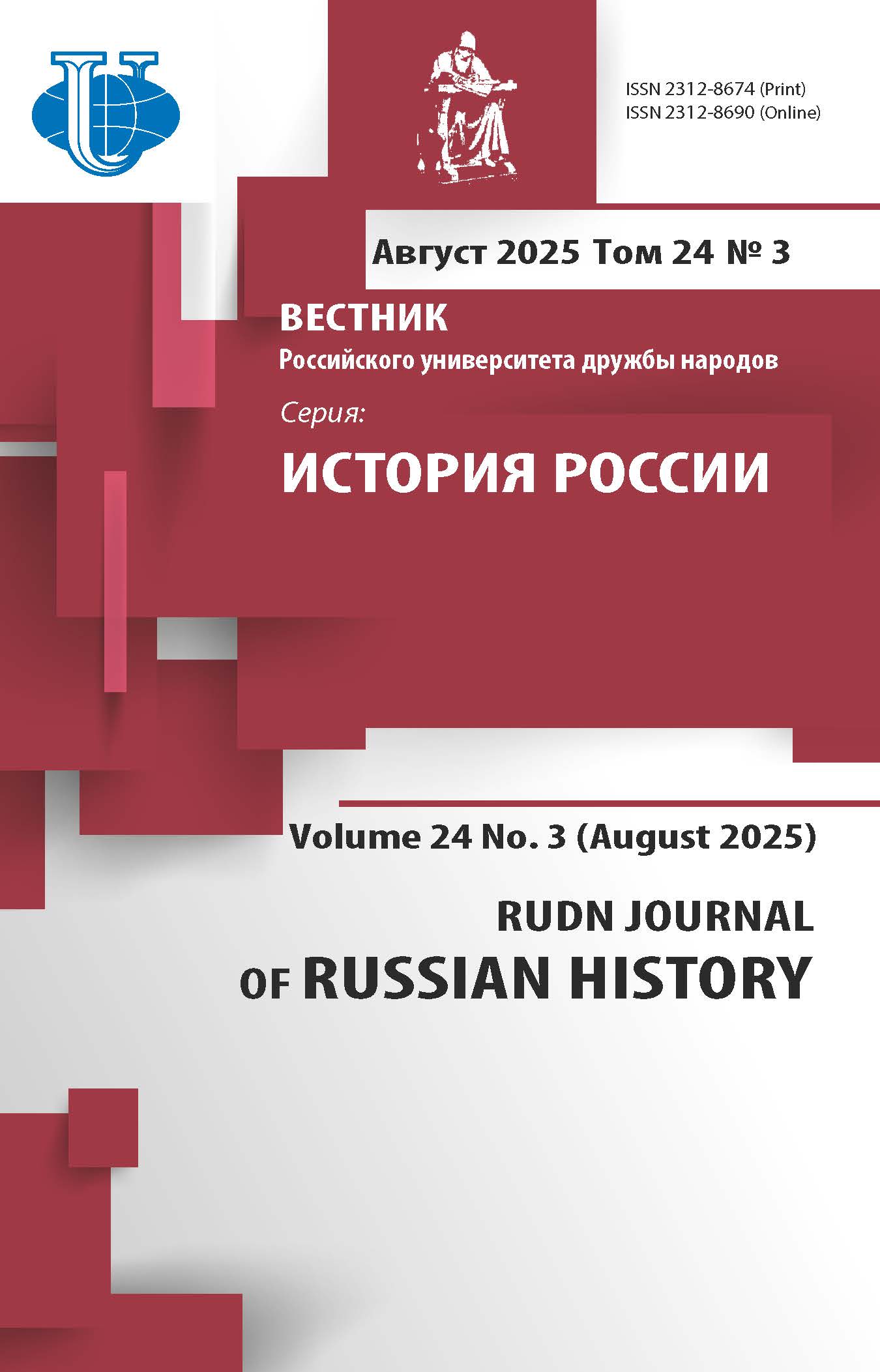Mugallima: Tatar women’s new social and professional role in the early 20th century
- Authors: Gabdrafikova L.R1
-
Affiliations:
- Sh. Marjani Institute of History of the Tatarstan Academy of Sciences
- Issue: Vol 18, No 2 (2019): Russian history in the gender dimension
- Pages: 302-319
- Section: WOMAN IN LABOR
- URL: https://journals.rudn.ru/russian-history/article/view/21197
- DOI: https://doi.org/10.22363/2312-8674-2019-18-2-302-319
- ID: 21197
Cite item
Full text / tables, figures
Abstract
In this article, the author discusses a new social group within the Tatar secular intelligentsia - the female teachers ( mugallima s) of the national primary schools. The study is based on personal documents, in particular memories and autobiographies. At the turn of the 20th century, the issue of female education became particularly important in Tatar society. The author shows the transformation of the role of the ostazbika - the imam’s wife who traditionally used to teach the girls of the Muslim community - and presents an overview of the first Tatar girl schools. Pointing out the sources of the formation of mugallima as a separate social group, the author also identifies an intermediate variant of this social group. Furthermore, attention is paid to the problem of advanced training of the mugallima, the legal regulation of Tatar female teachers’ activities, and to their official duties as well as their material conditions. The author studied the mugallima’s position in the Muslim society in relation to the gender role of an average woman, considering the everyday behavior of the mugallima, the mugallima’s image in Tatar literature as well as the way different social groups perceived this profession. The author concludes that in Tatar society the professional status of the mugallima was legalized only during World War I, and the social perception of the mugallima remained ambivalent. While traditional Muslim society continued to disapprove of independent women, the national intelligentsia supported a positive image of the mugallima. However, the issue of combining pedagogical work and family remained open. Tatar feminists of the revolutionary epoch considered the work of the mugallima as an alternative to family life and put the interests of the nation before their private life.
About the authors
Liliya R Gabdrafikova
Sh. Marjani Institute of History of the Tatarstan Academy of Sciences
Author for correspondence.
Email: bahetem@mail.ru
Doctor of Historical Sciences, Chief Researcher of the Department of Historical and Cultural Heritage of the Tatarstan Republic’s Peoples of Sh. Marjani Institute of History under Tatarstan Academy of Sciences.
7, Baturina St., Kazan, 420111, RussiaReferences
- Amirkhanova, Z. “Abyem turynda.” Kazan utlary, no. 1 (1986): 69–72 (in Tatar).
- Biktimirova, T.A. Stupeni obrazovaniya do Sorbonny. Kazan: Tatarskoe knizhnoe izdatel’stvo Publ., 2011 (in Russian).
- Biktimirova, T.A. Tatar khatyn-kyzlary məg”rifət yulynda. Kazan: Pechatnyi Dvor Publ., 2001 (in Tatar).
- Burnasheva, Z. Tatar khatyn-kyzlary khərəkəte tarikhynnan. Kazan: Tatarstan kitap nəshriyaty Publ., 1971 (in Tatar).
- Brileva, D. “Women Talking About Women: A Muslim Woman in the Tatar Periodical Press of the Early 20th Century,” Gosudarstvo, religiya, tserkov’ v Rossii i za rubezhom, no. 2 (2018): 17–36 (in Russian).
- Faizov, S. Dvizhenie musul’manok Rossii za prava zhenshchin v 1917 g.: stranitsy istorii. Nizhny Novgorod: Makhinur Publ., 2005 (in Russian).
- Fəhreddin, R. Asar. Vol. 3–4. Kazan: Ruhiyat Publ., 2010 (in Tatar and Russian). Fəizi, M. P’esalar. Kazan: Tatarstan kitap nəshriyaty Publ., 2017 (in Tatar).
- Gabdrafikova, L.R. “ ‘Nas hotyat sdelat’ bol’shevikami, verootstupnikami…”: musul’manki Volgo-Ural’skogo regiona v 1917 godu.” In Chelovek v revolyucii: Kazanskaya guberniya. Vol. 2. Kazan: Institut istorii AN RT Publ., 2017 (in Russian).
- Gabdrafikova, L.R., Izmailov, B.I., and Salikhov, R.R. Firma Alafuzova (vtoraya polovina XIX – nachalo XX veka): promyshlennaya istoriya Rossii. Kazan’: Institut istorii Mardzhani AN RT Publ., 2015 (in Russian).
- Gatina-Shafikova, D.F., and Shafikov, I.F. “A woman’s appearance in the cross-gender space of the Muslim society of the Volga and Cisural regions: discourse and practice.” Gasyrlar avazy, no. 1 (2018): 179–191 (in Russian).
- Gibatdinov, M.M., and Soltanov, F.M. Tatar pedagogik fikere antologiyase. Vol. 1. Kazan: Tatarstan kitap nəshriyaty Publ., 2014 (in Tatar).
- Gorohova, L.V. Medrese Kazanskoy gubernii vtoroy treti XIX – nachala XX v.: sbornik dokumentov i materialov. Kazan: Gasyr Publ., 2012 (in Russian).
- Hablemitoğlu, Ş., and Hablemitoğlu, N. Şefika Gaspıralı ve Rusya’da Türk Kadıin Hareketi (1893–1920).Ankara: [S.n.], 1999 (in Turkish).
- Iskhakyy, G. Əsərlər. Vol. 6. Kazan: Tatarstan kitap nəshriyaty Publ., 2005 (in Tatar).
- Mahmutova, A.H. Pora i nam zazhech’ zaryu svobody (Dzhadidizm i zhenskoe dvizhenie). Kazan: Tatarckoe knizhnoe izdatel’stvo Publ., 2006 (in Russian).
- Makhmutova, A. “Fenomen Mukhlisy Bubi.” Gasyrlar avazy, no. 1/2 (2000): 203–214 (in Russian).
- Mahmutova, A.H. Millət analary: tarihi-dokumental’ һəm biografik җyentyk. Kazan: Jyenne Publ., 2012 (in Tatar).
- Mukhetdinova, A. “Kem ul mөgallimə Fatyima?” In Iskhakyy G. Əsərlər. Vol. 8. Kazan: Tatarstan kitap nəshriyaty Publ., 2001: 203–207 (in Tatar).
- Nogmanov, A.I. Istoriya tatarskikh selenii Gornoi storony (Akzegitovskaya volost’ Tsivil’skogo uezda Kazanskoi gubernii). Kazan: Institut istorii Mardzhani AN RT Publ., 2018 (in Russian).
- Rəsүleva, Z., Huҗiəhmətov, Ə. Məg”rifət joldyzlygynda. Kazan: Matbugat jorty Publ., 1998 (in Tatar).
- Smirnova, V.N. Zhenshchiny Tatarii v bor’be za vlast’ sovetov. Kazan: Kazan University Publ., 1963 (in Russian).
- Sөngati, G. Shigyr’lər һəm prozalar. Kazan: Meddok, 2017 (in Tatar). Timershin, I. Ak”eget avyly tarikhy səkhifələre. Kazan: [S.n.], 2001 (in Tatar).
- Vafina, H.M., and Kisileva, A.N. Zhenshchiny Bashkirii. Sbornik materialov. Ufa: Bashkirskoe knizhnoe izdatel’stvo Publ., 1968 (in Russian).
- Zagidullin, I. Modernizacionnye processy v tatarsko-musul’manskom obshchestve v 1880-e – 1905 gg.: dokumenty i materialy. Kazan: YAz Publ. 2014 (in Russian).
- Zheleznyakova, Yu.E. Zemskaya shkola v Kazanskoi gubernii: 1865–1917 gg. Kazan: Kazan University Publ., 2002 (in Russian).
Supplementary files















